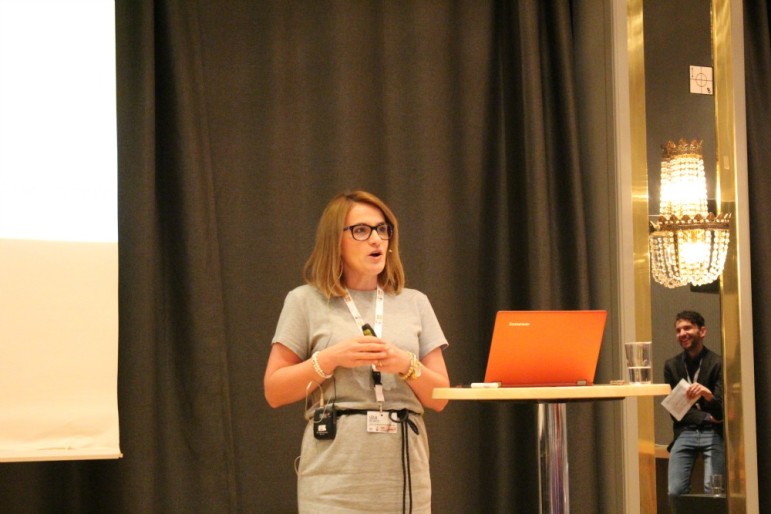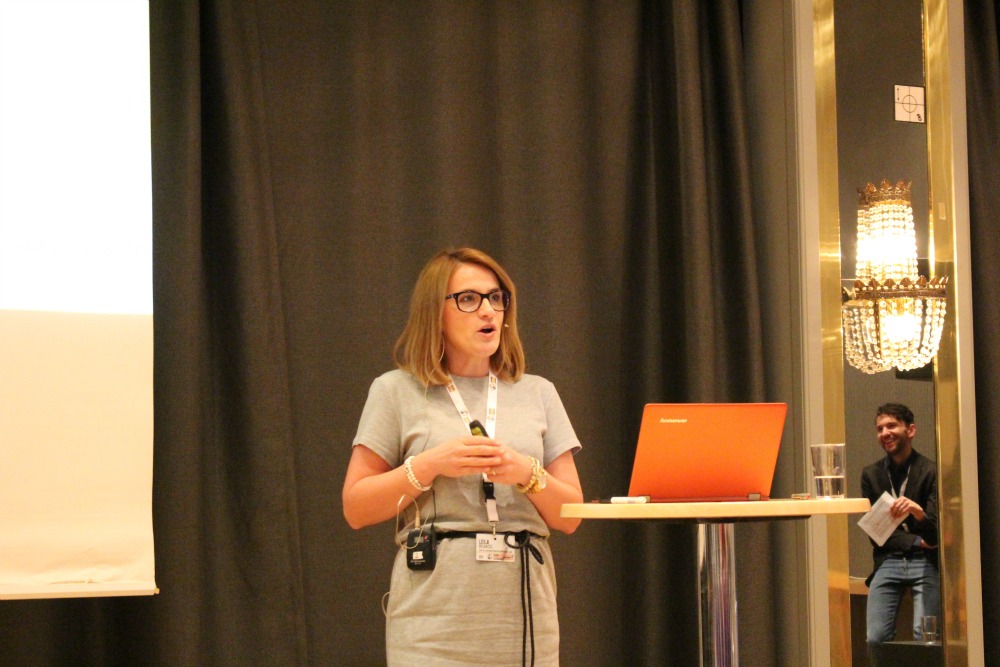
Leila Bicakcic, director of the Center for Investigative Reporting in Bosnia. Photo: Luigi Serenelli.
On supporting investigative journalism, Guenter Bartsch got straight to the point: “Doing great journalism, I am sorry, isn’t enough,” said Bartsch, managing director of Netzwerk Recherche, the German Association of Investigative Journalists.
Indeed, at first glance, long, in-depth investigative works are economically unsustainable. But journalists and experts at the Global Investigative Journalism Conference point to successful models among newsrooms that dig into public interest stories often hidden from the public.
“Strategy is identity, brand is identity that you present at the outside world,” explained Leila Bicakcic, director of the Center for Investigative Reporting in Bosnia and Herzegovina, about her nonprofit group’s successful fundraising strategy. “Fundraising is putting these two things together.”
“Team is important,” she added. “Think also about your team structure, build it.” An investigative team needs to explain the reasons behind its investigative reporting, “because you are contributing to a cause, for example in a local community.” And digital platforms offer an opportunity to market your journalism directly.
Another perspective was offered by Valer Kot, digital media consultant at the Media Development Investment Fund, an organization that provides financial support to independent media businesses. MDIF provides business know-how to help journalist-driven news outlets become sustainable, he explained. “The precondition of sustainable business is diversified revenues.”
MDIF has invested in 108 clients that range from independent ownership to general interest news media or high-quality reporting through 324 projects across 38 countries.
Kot puts an emphasis on advertising. He gives the example of Scroll.in, an independent mobile digital daily that in a short time built a reputation with award-winning journalism. “ Scroll.in partnered with Quartz, an economic news site, which allowed it to make use of Quartz’s advertisement business.
Historically, investigative reporting has always faced economic challenges, even during the so-called “old good days.”
“It’s always being a struggle,” said David Kaplan, director of the Global Investigative Journalist Network, or GIJN. “But in the days when advertisements flowed to the mainstream media, it was easy for publishers to subsidize an investigative team. Now we have to think creatively of how to make money.”
A new report, Financing Quality Journalism, lists 52 ways that enable quality media organizations to make money, Kaplan noted. He stressed that making money and fundraising were not bad things, and that journalists need to learn business skills to survive.
In the last five years, Kaplan said, the number of nonprofit investigative groups worldwide has doubled. But, he said, “You have to have a sustainable strategy.”
Still, only about 2% of the international media assistance goes to support investigative journalism. “We need to work to improve that.”
 Luigi Serenelli is a Berlin-based reporter and features writer with a background in foreign policy. His recent focus has been on immigration to Germany and Europe. He produced a video report on Islam in Berlin and a photo essay on highly-qualified Syrian refugees. His multimedia work includes stories of suburban tensions in Milan and social engagement in Scampia, a stronghold of the Neapolitan mafia. He works in Italian, English and German.
Luigi Serenelli is a Berlin-based reporter and features writer with a background in foreign policy. His recent focus has been on immigration to Germany and Europe. He produced a video report on Islam in Berlin and a photo essay on highly-qualified Syrian refugees. His multimedia work includes stories of suburban tensions in Milan and social engagement in Scampia, a stronghold of the Neapolitan mafia. He works in Italian, English and German.
Luigi Serenelli reports on this event as part of the IACC Young Journalists Initiative, a network reporting on corruption around the globe.

